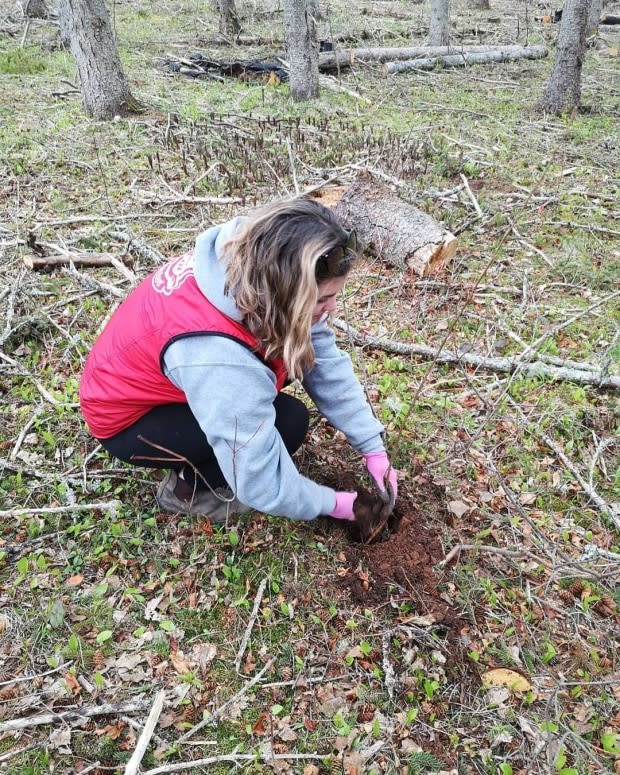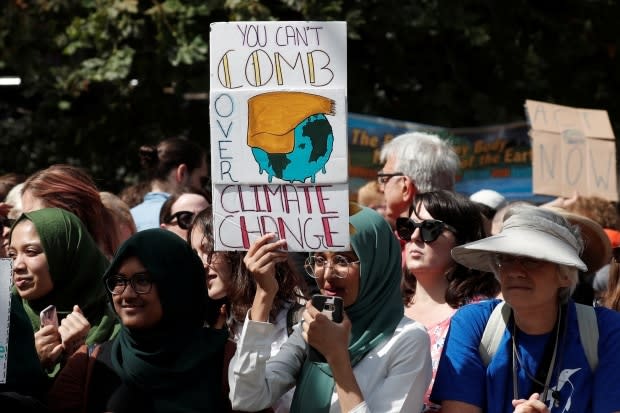Eco-anxiety spurs youth to take action on climate change
This story is part of a CBC News series titled In Our Backyard, which looks at the effects climate change is having in Canada, from extreme weather events to how it's reshaping our economy.
Emma Lim, 18, announced this week that she's not going to have children until governments take serious action on climate change. The movement she launched spurred thousands more across Canada to make a similar promise called the No Future pledge.
"My generation is facing a future of economic instability, food scarcity, extreme weather events, and we, the children, are desperate," the McGill University student said at a news conference in Ottawa on Monday.
Lim and other young people around the world are trying to get their voices heard. Led by the actions of 16-year-old climate activist Greta Thunberg, thousands took to the streets on Friday with demonstrations across the globe — a precursor to the UN Youth Climate Summit starting in New York on Saturday.
With fires, floods, and pollution growing faster and more serious every year, children and young people are scared that they'll be bearing the brunt of this crisis. It's spawning a condition called eco-anxiety, a fear of environmental catastrophe. And while it's not officially recognized as a medical diagnosis, some experts say it's a real phenomenon.
"The issues of the changing climate are reaching a sense of emergency as well as urgency," said Dr. Irena Buka, clinical professor of pediatrics at the University of Alberta.
She recently co-authored a position statement from the Canadian Paediatric Society on global climate change and Canadian children's health.
It listed for doctors a number of climate-related threats to children and their bodies. They included:
Heat and cold related deaths.
Air pollution.
Contaminated water.
Infections.
"Now we have to start thinking about infections that don't normally reside or affect children in our region. We have to start thinking of things that we think existed only in warmer, tropical climates," Buka said.
In Oyster Bed, P.E.I., just outside of Charlottetown, university student Paige Martin is all too aware of the impact climate change may have on her community.
"Sometimes you hear on the Island that the Island will be under water if we don't change our ways because we are such a small island and we are surrounded by water."
Martin, her friends and her family are trying to do their part. Last spring,she founded a non-profit organization called Green Everlasting P.E.I. The group leads roadside cleanups, tree plantings, and tries to educate Islanders about what they can do to stop climate change.

"It makes me feel a lot better because I don't feel like I'm doing nothing. I feel like I'm taking a step forward. I'm taking action," she said.
That sense of control is important to combat a sense of helplessness, according to Prof. Julia Woodhall-Melnik, a professor of sociology at the University of New Brunswick in Saint John.
She studied the mental health impact of two years of extreme flooding that hit the province starting in 2018, which was considered one of the worst years for flooding in recent memory.
Action alleviates anxiety
"There was a lot of anxiety, a lot of stress. People were mentally and physically exhausted," she said.
Woodhall-Melnik said it rubbed off on the children, but many of them turned that anxiety into action, something she called "post-traumatic growth."
"There were a lot of kids who really wanted to get out and help their communities. There were instances of moms taking their very young children, five, six, years old and bringing them to sandbag for their neighbours. So exposing them to community that way has a positive impact on well-being and community growth," she said.

Woodhall-Melnik applauds the position statement of the Canadian Paediatric Society.
"If our youth are worrying or experiencing these extreme forms of anxiety we need to make sure that medical professionals, public health officers, even teachers are well equipped to step in and intervene, recognize the mental health concerns, and help them deal with it in a realistic way," she said.
Members of Lim's group, Climate Strike Canada, are hoping their pledge of not bringing more children into the world serves as a poignant wake-up call for action. Her mother, Catherine Cartman, a former lawyer who worked within the oil and gas industry, is still hoping that one day she will become a grandmother. But she understands her daughter's decision.
"It is heartbreaking and horrifying to see our kids worry about something that until now we just took for granted," she said. "We cannot let our children shoulder this burden alone."



